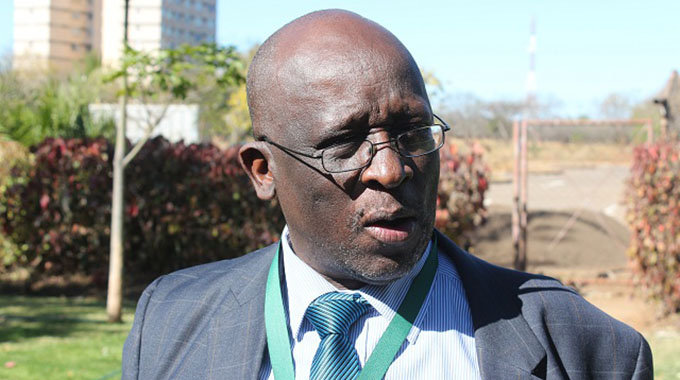Zim must embrace genome editing to boost agric productivity

Sifelani Tsiko-Agric & Innovations Editor
Advances in gene editing technologies have generated a great amount of interest within the scientific community in Zimbabwe over the past few years.
Scientists, here, all agree that new breeding technologies, such as genome editing using CRISPR/Cas9 have the potential to improve agricultural productivity in the country
And the holding of genome editing workshop organised by the African Union Development Agency (AUDA-NEPAD) and the National Biotechnology Authority to help the country to increase and scale up the use of biotechnology, in particular genome editing, is a huge step for the country in terms of tapping the potential of gene editing technology.
Zimbabwe is among other selected countries such as Burkina Faso, Ghana, Ethiopia, Nigeria, Mozambique, Kenya and Malawi that were chosen to pilot the application of genome editing research towards product development.
Gene editing technology allows scientists to edit any gene they target, enabling them to find and change or replace genetic defects.
Gene-editing science and technology is in its early stage in Zimbabwe and most African countries and the potential of this technology is still to be harnessed.
Under the Second Republic, biotechnology is no longer seen as an option but as a necessity that should be deployed alongside other conventional methods to improve genetic gains for enhanced crop productivity and agriculture value chain transformation.
Zimbabwe is now home to one of the most established innovation ecosystems in Africa with technology and innovation hubs, agro-industrial parks and incubators, giving space to developers, designers, researchers and entrepreneurs to work on new technological solutions.
Scientists are encouraged by the country’s move to dive deeper into the world of gene — editing technologies to improve agricultural productivity.
“New genome editing technologies have a huge potential of transforming the country’s agricultural productivity,” said Mr Zephaniah Dhlamini, an academic and director of the National University of Science and Technology’s (NUST) Applied Genetics Testing Centre.
“Gene — editing technology involves targeting specific genes in a single organism and disrupting those linked to undesirable characteristics or altering them to make a positive change. Traditional genetic modification, by contrast, involves transferring a gene from one kind of organism to another.
“We can harness this technology in a variety of ways to improve crop breeding and agricultural productivity.”
He said gene — editing allows for a higher level of precision than traditional modification.
The technology which used to face stringent rules which apply to research that involved genetic modification in most African countries.
However, Zimbabwe and other African countries are gradually accepting gene editing technologies as they seek new tools to boost food security and agricultural productivity.
Mr Willard Manungo, deputy chief secretary for Policy Analysis, Coordination, Devolution and Development Planning in the Office of the President and Cabinet told the genome editing workshop organised by the African Union Development Agency (AUDA-NEPAD) and the National Biotechnology Authority that the country embraced the adoption of new and emerging technologies.
“President Mnangagwa’s vision of transforming Zimbabwe into a knowledge driven and industrialising upper middle income economy by 2030 aligns with the AU’s Vision and Agenda 2063,” he said.
“This cooperation demonstrates that Zimbabwe is indeed open for business contrary to the unsubstantiated negative perceptions that had resulted in some development partners withdrawing support. We are indeed enthused to be considered in NEPADs current development initiatives and be part of the continental agenda.”
AUDA-NEPAD has engaged high-level policy makers, senior government officials and stakeholders on this initiative to enhance the uptake of modern biotechnology in general and genome editing in particular towards optimising agriculture in Zimbabwe and Africa.
The goal of the initiative is to foster a deeper understanding of genome editing (GEd) among key and different stakeholder groups through tailored communication and advocacy for enhanced uptake of the tool to optimize agriculture value and supply chains in Africa.
This includes support to the achievement of key development outcomes, such as adapting to climate change and reducing poverty and sustainability of food systems.
Ms Florence Nazare, acting director of AUDA-NEPAD for knowledge management and programme evaluation said African countries must harness modern biotechnology applications to drive industrialisation and inclusive growth that improves livelihoods on the continent.
“The essence of this workshop is to help African countries to realise socio-economic transformation and attain Agenda 2063 goals,” she said.
“With science, technology and innovation as the driver, the AUDA-NEPAD is supporting and putting more effort to promote the wider utilisation of modern biotechnology. Gene editing is one of the tools of biotechnology to optimise agriculture and food systems in Africa.”
She said this project builds on and complements on-going AUDA-NEPAD efforts towards enhancing regulatory capacities on Biosafety through the African Biosafety network of Expertise (ABNE).
While ABNE’s focus is on regulation to ensure biosafety, the AUDA-NEPAD Centre of Excellence in Science, Technology, and Innovation brings in a focus on innovation and R&D capacities towards the commercialisation of genome edited agricultural products to improve livelihoods.
National Biotechnology Authority chief executive and registrar, Dr Tonny Savadye said Zimbabwe needed to strengthen and harmonise innovation and emerging technologies to promote efficiency and the development of technology that responds to the country’s demands.
“We need to integrate all the emerging technologies so that they bring out efficiency and digitalisation,” he said.
“Even if its biotechnology, it must be linked with medicine, agriculture, pharmacy and ICTs to come up with a new package on a platform that links all scientific interventions that respond to local needs.”
Experts at the workshop said challenges remain addressing gaps in financing, laboratory infrastructure, materials and trained personnel.
Mr Dhlamini said improving skills was important for the development and uptake of genome editing applications.
“We need to see the skills set if we are to work in genomic work,” he said. “There is no one institution that has all the skills set.
We need to form synergies on our skills set to have a vibrant genomic editing system in Zimbabwe.”
Zimbabwe allows gene editing science technologies at research level.
Dr Savadye said the country was now developing a regulatory framework to harness the full potential of gene editing technologies.
Scientists say gene editing is different from genetic modification (GM), as it does not result in the introduction of DNA from other species.
Local scientists say gene — editing could help improve crop harvests with a wide array of desirable traits that include — better-taste, drought — resistance and crop suitability for cold storage and other chains.
Zimbabwe now has technology and innovation hubs, agro-industrial parks and incubators, giving space to developers, designers, researchers and entrepreneurs to work on new technological solutions.
The country has also embraced emerging technologies such as block-chain, data science, artificial intelligence (AI), cloud computing, Internet of things (IoT), gene editing, biotechnology and other sciences to spur industrialisation.
Zimbabwe now has the National Data Centre and the High Computing Performance Centre at the University of Zimbabwe and an array science and innovation hubs that have the capacity to produce hydrogen for energy and lithium ion batteries that are key in the transformation and industrialisation of the country.
“The Government has prioritised human capital development and innovation with emphasis on Science, Technology, Engineering and Mathematics (STEM) subjects. This supports home-grown innovations in all areas of the economy, including agri-business amongst the youth,” Mr Manungo said.
Higher and tertiary education institutions have adopted Education 5.0 centred on equipping graduates with skills that empower them to become innovative towards societal development through transformative science and technology knowledge application that delivers goods and services.







Comments